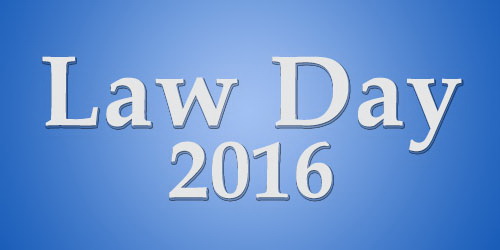Law Day 2016 – 50th Observance of Your Miranda Rights

What is Law Day? Law Day is observed in many communities throughout the United States as a day to appreciate our American heritage of liberty, justice and equality under the law. It is a day to reflect on the importance of the rule of law in our society and to reflect on how fortunate we are to live in a nation that affords us the rights and protections under those laws. This 2016 year, Law Day will focus its theme on our “Miranda” Rights.
Law Day is not a holiday; it is an observance. Banks, post offices, and government offices do not close. Neither do schools. In fact, many Law Day activities focus on education. We see yearly writing contests, art contests, and other competitions and activities centered around the theme of the law for that year. Special Law Day programs are also held. An example is the one sponsored yearly by the Superior Court of New Jersey, Essex Vicinage. Some school districts invite attorneys to their classrooms to discuss their particular area of expertise: Criminal Law, Domestic Violence issues or other Family Law matters, etc.
The first Law Day was observed on May 1, 1958. It was proclaimed by President Eisenhower to celebrate our legal system and honor the importance of the rule of law in the founding of our nation. Three years later–in April 1961—the United States Congress passed a joint resolution recognizing May 1 as Law Day.
How Did Law Day Originate?
The idea of having a Law Day was proposed by the American Bar Association in 1957. May 1 was selected as the date Law Day would be observed in order to disassociate that date from the celebration of May Day, which was being observed in many countries throughout the world. May Day, also known as Labour Day and International Workers Day, had become increasingly associated with communist ideology. Although Labor Day in the United States had already been moved to September, it was hoped that proclaiming May 1 Law Day would further distance the date from May Day in the United States.
Why Observe Law Day?
The joint resolution passed by Congress in 1961 described Law Day as “a special celebration by the people of the United States.” It described the purposes of this celebration:
- to show appreciation of the liberties we enjoy in this nation;
- to reaffirm loyalty to the United States;
- to rededicate ideals of liberty and justice under the law; and
- to cultivate respect for the law.
This Year’s Theme
Law Day is not a federal holiday, but May 1 has been proclaimed Law Day by every President from President Eisenhower to President Obama. Each year the American Bar Association chooses a different theme for celebration. The theme for Law Day 2016 is Miranda: More than Words. Miranda: More than Words
The theme Miranda: More than Words was selected because June 13, 2016, marks the 50th anniversary of the United States Supreme Court ruling on which the Miranda warning is based. On that date the Supreme Court handed down its decision in Miranda v. Arizona. Miranda had been convicted of kidnapping and rape, and his conviction had been upheld by the Court of Appeals.
The Supreme Court decision resulting in what is now known as the Miranda warning actually concerned four separate cases. In each of the four cases, the defendant was questioned without first being informed of his constitutional rights. The questioning of all four resulted in oral confessions; three of the defendants also gave written statements. All four defendants were convicted, and three of the convictions were upheld in a court of appeals.
These cases finally went to the United States Supreme Court. There were two main issues to be decided:
- Can statements made during a custodial police interrogation be used against a defendant in a criminal trial?
- Must steps be taken to be certain that the individual is not forced to incriminate himself?
The Court reversed all three judgments that had upheld the convictions and affirmed the judgment that had overturned the conviction. In doing so, the Court ruled that “the prosecution may not use statements resulting from custodial interrogation unless steps have been taken to advise the individual of his rights.” The result was what is now known as the Miranda warning, or Miranda rights.
Miranda was later retried without the confession and convicted.
Miranda Warning
The Miranda warning makes certain provisions regarding the questioning of a suspect in custody. These provisions must be met in order for any statement or piece of evidence supplied by the suspect to be used in a court of law. The suspect must be informed that…
- he has the right to remain silent;
- anything he does say may be used against him in a court of law;
- he has the right to have an attorney present before any questioning if he so desires; and
- if he cannot afford an attorney, one will be appointed for him.
The Supreme Court decision in Miranda v. Arizona did not give suspects any legal rights they did not have prior to the ruling; nevertheless, it was one of the most important decisions in the history of the Supreme Court. The Miranda warning ensures that those being interrogated understand their constitutional rights.








